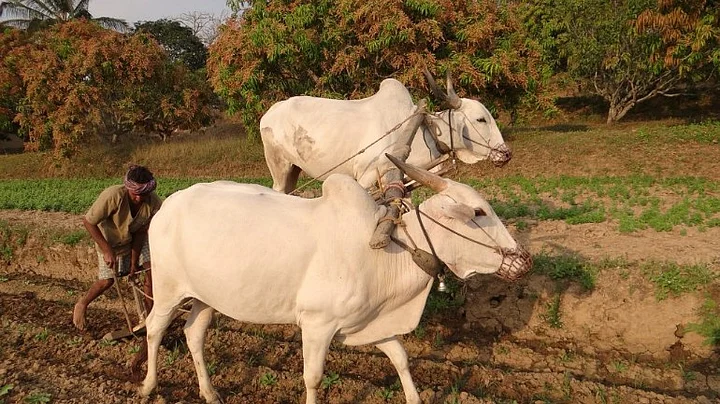Dheeraj from Sandila, a small town in Uttar Pradesh, India, has never heard about COP27 that concluded recently in Egypt or the Paris agreement.
While climate experts worldwide are talking about climate change, global warming, possible reasons, way ahead etc. Dheeraj is also trying to find solutions to save his crops from early heat waves and unpredictable rains.
A smallholder farmer, he owns two acres of land as his only source of livelihood. His father and forefathers were all farmers. However, the low income, recent losses, and unpredictable weather makes Dheeraj wonder if he wants his children to be farmers, too.
In the recent past, he has tried his hands at everything from growing fancy crops to using more urea, but the lack of correct knowledge and adequate support has made him more miserable and desperate. He now ironically feels that he is living his name Dheeraj (patience), waiting for his days to change.
For smallholder farmers like Dheeraj, adopting new agricultural practices is far more critical now than in the past.
When small-scale farmers adopt and plant improved crop varieties, they increase their farm income and escape poverty, thereby increasing local food security.
The role of small-scale farmers in ensuring food, nutrition security and sustainable rural development is becoming more crucial as the world faces increasing climate change challenges.
But the think-tanks, ministries and global discussions on climate change focus on warming, carbon footprints, harmful gases, industrial waste, solar, etc. Farming and farmers seldom make it to these discussions.
What most of us tend to overlook is how smallholder farmers can be vital in solving food security and also climate change issues.
The biggest mistake modern or industrialised agriculture has made is that it separated farm animals from the farm. In small farms and earlier days, the agricultural waste used to be the cattle’s fodder, and it came back to the farm in the form of manure.
However, to fulfil the significant industry demand, we got quantity rather than quality and created these climate-related issues in the process. If you go to the deep tribal indigenous farming tribes, they are the best keepers of the climate.
They have the wisdom to use nature in its best possible way, like natural methods of preserving and growing crops without artificial storage or heavy pesticide, giving back to nature.
Studies show that sustainable agriculture practices on small farms can be highly productive, with a rise in harvest and a reduction in the input cost due to the limited need for fertilisers and pesticides.
With extensive industrialisation focusing on producing more, the agriculture policies today fail to recognise how crop choices, input costs and the supply chain are all interlinked, preserving marginal farming. Moreover, growing more food isn’t the ultimate solution to employment or supply chain.
Smallholder farmers face several obstacles in sustaining their livelihoods. They battle a changing climate, with more spells of drought and more intense storms and rain.
Another major challenge that makes their life more miserable is finding regular buyers, especially with the global food market expectations of robust produce throughout the year without considering seasonality, climate calamities and how far it needs to be shipped.
So, in the lack of proper information or support from the government in combating climate change, the farmers tend to adapt on their own, whether it’s adaptation or maladaptation, to keep their source of livelihood running.
Practices like limited ploughing, more crop rotations, cover crops planting, and livestock reintegration into farms has proven to reduce agriculture’s footprint and capture the excess carbon generated by other industries along with the reduced input costs.
But these prominent choice practices still need to catch up to the traditional agriculture practices used by farmers globally. But why? Here are the possible answers.
These kinds of farming methods require farmers to embark on uncharted territories without guaranteeing immediate success. The harvest initially decreases in the early transition phase as they gain the necessary experience to learn and perfect the implementation of more regenerative and beneficial practices.
A decrease in production poses a difficult financial challenge, especially for smallholder Indian farmers, who already have a hard time with fewer resources.
Successful adaptation measures, therefore, require sustained, consistent action, more small-scale participation and long wait times for proof of concept.
The focus on quantity over quality is the same across the globe. In India, to cater for the growing population and income, the decision-makers have rolled out an initiative to double food production by 2050.
This goal has now become the ultimate benchmark of every policy and the metric for measuring farmer’s success.
Another critical challenge is the need for more data and available information on these management practices.
Right now, a major chunk of climate financing goes to mitigation, but we need to be just as ambitious and innovative when it comes to helping people adapt to climate change.
That includes investing much more to help the hundreds of millions of smallholder farmers at the forefront of this global crisis trying to maintain their livelihoods.
The informed and empowered smallholder farmer will not only be able to upscale his livelihood but, in the process, will also be a significant contributor to climate change through regenerative agriculture with less or no pesticides and contribute to more local sources of food.
The incentivisation, credit for the carbon saved and support will also encourage Dheeraj and many smallholder farmers like him to get the next generations into agriculture without migrating to big cities doing menial jobs.
(Ruchit G Garg is the founder & CEO of Harvesting Farmer Network, an AgriTech company focused on enabling 120 million smallholder farmers in India.)
(This article was originally published at Carbon Copy, you can visit it here. It has been republished here with permission.)
(At The Quint, we question everything. Play an active role in shaping our journalism by becoming a member today.)
